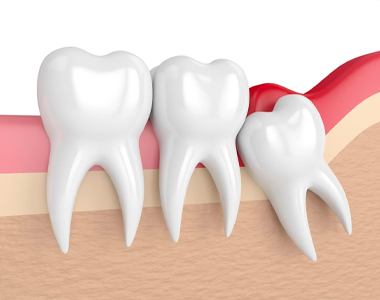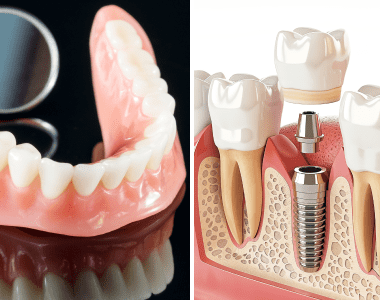
Wisdom Teeth
With age comes wisdom. Specifically, wisdom teeth.
Your mouth goes through many changes in your lifetime. One major dental milestone that usually takes place between the ages of 17 and 21 is the appearance of your third molars. Historically, these teeth have been called wisdom teeth because they come through at a more mature age.
When they come through correctly, healthy wisdom teeth can help you chew. It’s normal to feel a little discomfort when your wisdom teeth appear, but if you have pain, see your dentist immediately.
Room to Grow?
Wisdom teeth can lead to problems if there isn’t enough space for them to surface or they come through in the wrong position. If your dentist says your wisdom teeth are impacted, he or she means they are trapped in your jaw or under your gums.
As your wisdom teeth make their way through your gums, your dentist will be monitoring your mouth for signs of the following:
- Wisdom teeth that aren’t in the right position can allow food to become trapped. That gives cavity-causing bacteria a place to grow.
- Wisdom teeth that haven’t come in properly, which can make it difficult to floss between the wisdom teeth and the molars next to them.
- Wisdom teeth that have partially come through can give bacteria a place to enter the gums and create a place for infection to occur. This may also lead to pain, swelling and stiffness in your jaw.
- Wisdom teeth that don’t have room to come through are thought by some to crowd or damage neighboring teeth.
- A wisdom tooth that is impacted can form a cyst on or near the impacted tooth. This could damage the roots of nearby teeth or destroy the bone that supports your teeth.
Why You Might Need to Have Your Wisdom Teeth Removed
Every patient is unique, but in general, wisdom teeth may need to be removed when there is evidence of changes in the mouth such as:
- Pain
- Infection
- Cysts
- Tumors
- Damage to neighboring teeth
- Gum disease
- Tooth decay (if it is not possible or desirable to restore the tooth)
Your dentist may also recommend the removal of wisdom teeth as part of treatment for braces or other dental care.
Before making any decisions, your dentist will examine your mouth and take an x-ray. Together, you and your dentist can discuss the best course of treatment.
Keeping Your Wisdom Teeth?
Wisdom teeth that are not removed should continue to be monitored because the potential for developing problems later on still exists. As people age, they are at greater risk for health problems—and that includes potential problems with their wisdom teeth. Be sure to, floss around your wisdom teeth and visit your dentist regularly. Regular dental visits allow your dentist to evaluate your wisdom teeth and your overall dental health.

 Review Us
Review Us Review Us
Review Us 

